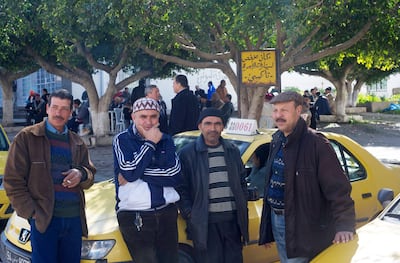Another rise in fuel prices in Tunisia has led taxi drivers to consider quitting.
In the late hours of Wednesday evening, authorities in the country announced that the price of petrol products would increase for the fifth time in a year.
The total increase from the start of 2022 has reached 20 per cent, putting pressure on those who drive to make a living.
A litre of regular diesel costs 1.98 Tunisian dinars ($0.61), compared with 1.65 dinars ($0.51) in January.
“I woke to this news, they always issue such decisions in the middle of the night as if they are stealing,” taxi driver Bassem Msekni, 37, told The National at a petrol station in L’Aouina suburb of the capital Tunis.
“People don’t understand that it’s not only the petrol products that increase, it’s everything relating car maintenance."
Mr Msekni said he was considering selling his car and leaving the profession because of the price increases.
“I can consume one litre of petrol just standing in traffic. If I sell my car and get a small truck to work in the mountains, I will probably earn more,” he said.
Taxi for sale
Some taxi drivers in the central Tunisian governorate of Gafsa have put “for sale” signs on their vehicles to protest against the overnight fuel increases, radio station Mosaique reported.
The Industry and Commerce Ministries said uncertainty in the global energy market caused by shrinking supplies and the high cost of supplying petroleum materials were to blame for the increases.

Kamel Azzouz, 57, has worked as a taxi driver for 35 years and said the rising costs were another blow to his efforts to make a living.
“I’m already living day to day, I am always in debt and I can’t even get a loan from any bank because I’m a taxi driver,” Mr Azzouz told The National.
Rises in the price of petrol products have had a knock-on effect on the price of basic goods and transport services.
That has presented a further challenge in Tunisia, where people already faced a shortage of basic goods.
Lorry driver Fawzi, 44, said he found out about the latest price rise when he arrived he filled up his tank.
“I have been wandering around looking for work since this morning and have not gotten any job so far,” he told The National.
“I came here to fill up the truck tank with 15 dinars’ worth of petrol from own pocket."
He was left with only a five dinar coin.
The situation could worsen after a joint decree between the Ministry of Industry and the Ministry of Finance on Wednesday amended the threshold on monthly price rises in petrol products from 5 per cent to 7 per cent.
Tunisia reached an agreement with the International Monetary Fund in October over a new $1.9 billion loan, which requires the country to introduce economic reforms.


